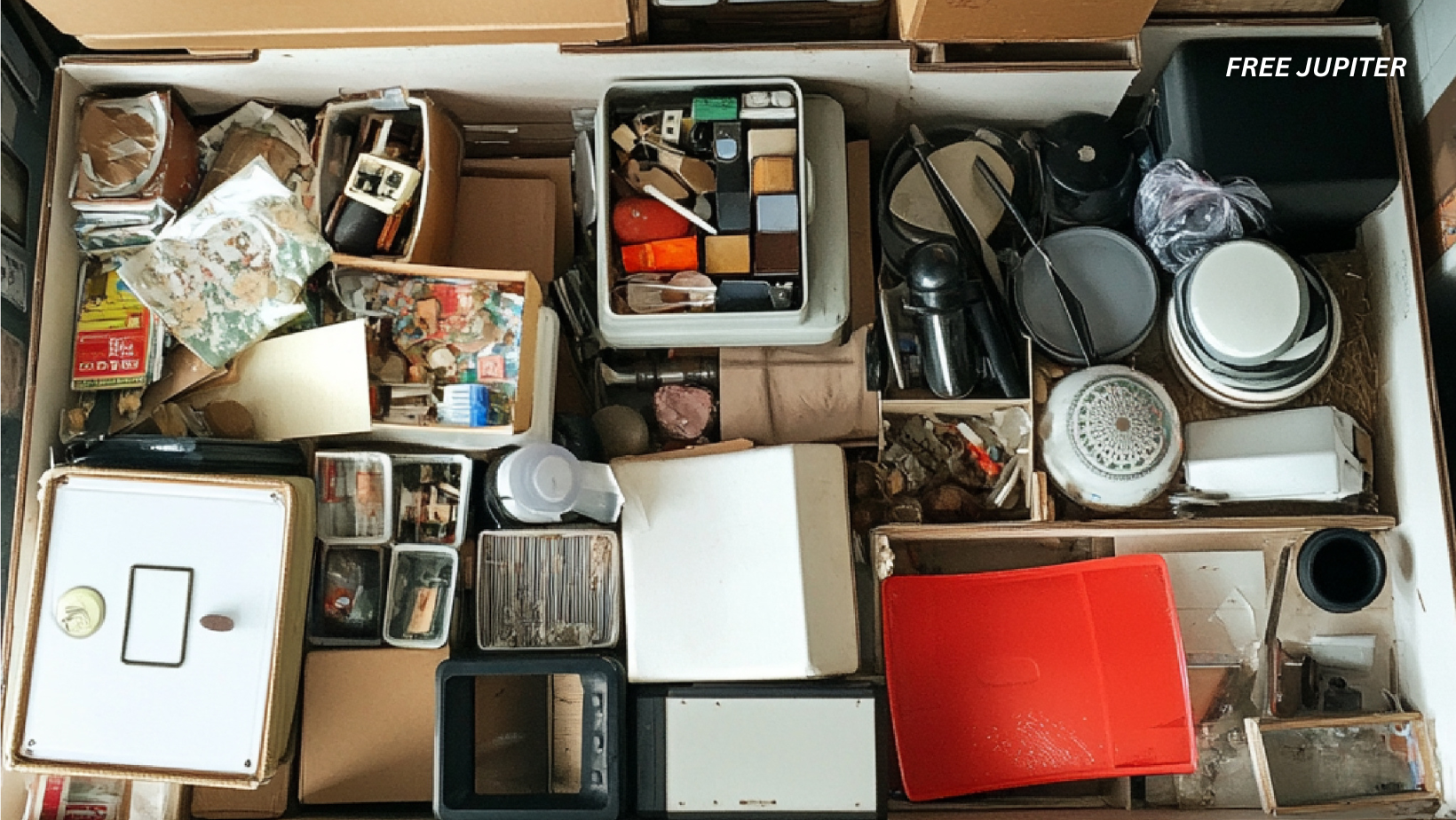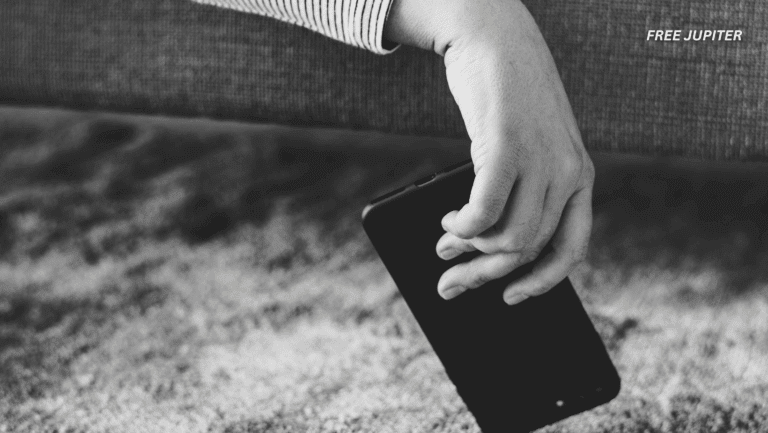Note: FreeJupiter.com shares general info for curious minds 🌟 Please fact-check all claims—and always check health matters with a professional 💙
Walk into almost any household and you’ll notice a common theme: too much stuff. Some of it is useful, much of it is sentimental, and a surprising amount is just sitting around gathering dust. Humans have a strange attachment to their belongings. Psychologists point out that we often tie objects to identity, security, or memories—making them difficult to part with, even when they no longer serve us.
But here’s the reality: clutter doesn’t just take up physical space. Studies have shown that it can elevate stress, reduce productivity, and even impact how well we sleep. A messy environment creates mental “noise,” making it harder to focus or feel relaxed.
The good news is that lightening your load doesn’t require a complete minimalist makeover. By targeting common clutter culprits, you can make your home feel more peaceful and functional without losing the items that truly matter. Below are twelve everyday things that almost everyone has but could live better without.
1. Appliance Manuals
That drawer filled with instruction booklets for toasters, alarm clocks, and air fryers? Chances are you’ve never looked at them after the day you unpacked the box. Nearly all appliance manuals are available online in PDF form, searchable in seconds.
Keeping piles of paper manuals doesn’t just waste space—it adds to the subtle background clutter that weighs down your living areas. If it makes you nervous to toss them, scan the few you think you might actually need and store them digitally. That way, you’ll keep peace of mind without a messy drawer of forgotten paper.
Read more: If You Don’t Care What Others Think, Your Home Probably Has These 12 Things In It
2. Old Power Cords and Chargers
Almost everyone has a bag or box filled with mystery cables. Some belong to long-forgotten gadgets, others don’t fit anything you own anymore. It’s easy to tell yourself, “I might need this someday,” but realistically, the odds are slim.
Electronic clutter can be tricky because you don’t want to toss cords into the trash. Luckily, many electronics stores and recycling centers accept cables, chargers, and small devices. By dropping them off responsibly, you not only clear space but also prevent harmful e-waste from ending up in landfills.
3. Pens and Pencils That Don’t Work
Open any desk drawer, and you’ll likely find a collection of pens and pencils that have long since dried up, snapped, or gone missing in action. The funny thing is, testing them all feels like such a chore that people rarely bother.
Here’s a simple trick: place a notepad on your desk, gather every writing tool in your home, and test them one by one. Keep the ones that work and recycle the rest. You’ll be surprised how much space you free up—and how satisfying it feels to finally let go of all that wasted ink and lead.
4. Broken Jewelry
A necklace with a snapped chain, a watch missing its battery, or a lone earring with no partner—these items tend to linger in drawers indefinitely. They carry just enough emotional weight to make us hesitate, yet not enough value to justify keeping them forever.
Instead of letting broken pieces pile up, set a one-week rule: if you plan to repair it, do so within seven days. If not, it’s time to donate, recycle, or repurpose the item. This small act removes “dead weight” from your collection and makes the jewelry you do wear much easier to find.
5. Worn-Out Clothing and Undergarments
Closets and dresser drawers are often the biggest clutter traps. Socks with holes, stretched-out T-shirts, faded jeans, or bras that have long lost their support—these items serve no purpose other than making your storage feel cramped.
Clothing also carries emotional baggage. Many people keep “goal clothes” that no longer fit, hoping they’ll serve as motivation. Unfortunately, these garments often do the opposite, silently reminding us of what we’re not instead of celebrating who we are now. Decluttering your wardrobe can be a surprisingly empowering step toward self-acceptance.
6. Childhood Memorabilia (Too Much of It)
There’s nothing wrong with keeping a few school drawings, report cards, or special keepsakes from your kids. But holding onto every project, award, or trinket quickly becomes overwhelming. Over time, boxes of “memories” can take over valuable storage space.
Even more importantly, when children grow up seeing every single object preserved, they may learn to overvalue material things instead of the experiences behind them. Try selecting just a few of the most meaningful keepsakes and either photograph or digitize the rest. That way, you preserve the memory without drowning in the material.
7. Expired Makeup and Skincare
Unlike pantry food, makeup and skincare products don’t always look spoiled when they’ve expired. But old mascara, foundation, or sunscreen can quietly grow bacteria that irritates skin, causes acne, or even spreads infection.
As a rule of thumb, mascara and liquid eyeliner should be replaced every three to six months, while lipsticks and powders can last a little longer. Check the small open-jar symbol on packaging for a guide to expiration. Regularly purging your bathroom cabinet not only protects your health but also keeps your routine simple and fresh.
Read more: 9 Powerful Traits That Drive Successful Introverts Without Them Even Realizing It
8. Duplicate Kitchen Utensils
Two spatulas might be useful. Ten? Probably not. Kitchens are especially prone to clutter, with gadgets and utensils multiplying over time. We hold on to duplicates thinking they might come in handy, but most end up forgotten at the back of a drawer.
Instead of hoarding, choose the best-quality or most comfortable utensils and donate the rest. Not only will you make cooking more efficient, but you’ll also know exactly where to find what you need when dinner prep rolls around.
9. Outdated Décor
Our living environments influence our mood and energy more than we realize. Décor that once felt stylish can quickly become dated or out of sync with who you are now. That retro wall clock, dusty faux plant, or mismatched artwork might be subtly draining your space.
Refreshing your home doesn’t always mean spending money. Simply removing décor that no longer fits your personality can instantly make a room feel brighter and more aligned with your present self.
10. Cardboard Boxes
Boxes often feel useful—they’re handy for moving, shipping, or storage. The problem is, they multiply quickly and take over closets and garages. Unless you have a move planned in the immediate future, most cardboard boxes simply eat up space and collect dust.
Break them down and recycle them regularly. You’ll notice how much lighter your storage areas feel without the constant pile of unused cardboard looming over you.
11. Coffee Mugs You Never Use
Somehow, coffee mugs seem to multiply all on their own. Between gifts, souvenirs, and office freebies, most people end up with cabinets stuffed full of mugs they rarely touch.
Ask yourself: do you actually enjoy drinking out of all of them? Probably not. Keep your favorites, and let the rest go. Donating extra mugs frees up space in your kitchen and gives someone else a chance to enjoy them.
12. Old Magazines and Newspapers
Stacks of magazines and newspapers feel harmless at first—but over time, they become towering reminders of procrastination. Many people keep them with the idea of re-reading or clipping articles, but realistically, it rarely happens.
In the digital age, nearly every article is archived online. By recycling old stacks, you free your space from unnecessary clutter while still knowing the content is accessible anytime.
Why Letting Go Matters
Decluttering isn’t just about aesthetics. It’s a mental and emotional reset. Research shows that cluttered spaces can elevate cortisol, the stress hormone, and even affect our ability to focus and make decisions. On the flip side, organized environments promote calm, creativity, and a stronger sense of control.
Releasing unnecessary items also teaches us detachment—reminding us that joy doesn’t come from the objects we hoard but from how we live and experience our space.
Read more: 12 Things Ordinary People Never Question That Brilliant Minds Always Do
Final Thoughts
You don’t have to strip your home bare to feel lighter. By targeting these twelve common clutter culprits—appliance manuals, cords, old pens, broken jewelry, worn clothes, over-kept keepsakes, expired products, duplicate utensils, outdated décor, boxes, unused mugs, and old magazines—you’ll free up space physically and emotionally.
The act of letting go creates room for what truly matters: peace, comfort, and the ability to fully enjoy the place you call home.










